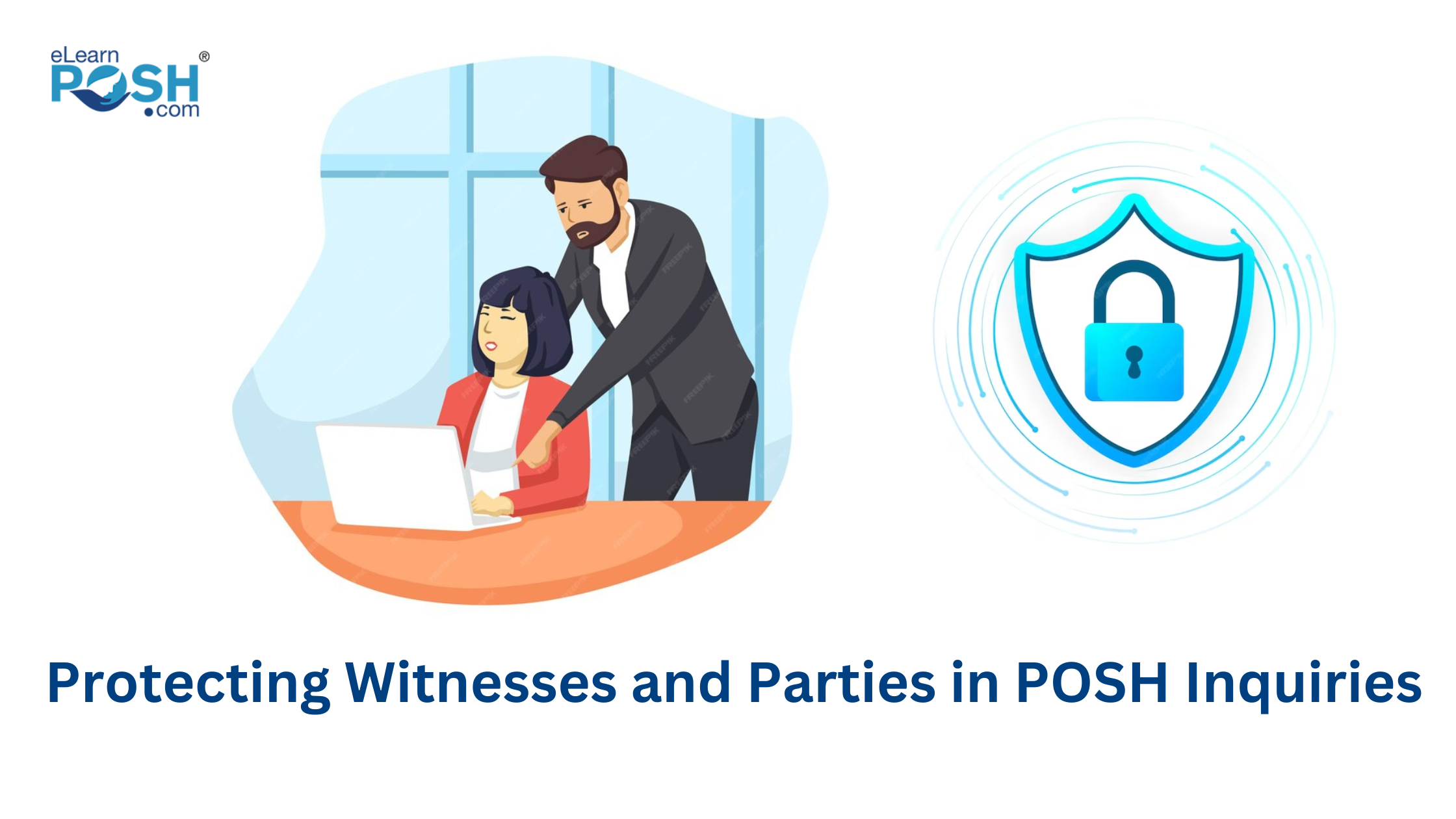 Introduction
Introduction
Handling POSH inquiries requires careful balance and understanding. These important investigations not only protect workplace safety and integrity but also touch on deep emotions and sensitivities, impacting everyone involved, including those who are complaining, witnessing, or being accused. This blog aims to navigate the intricacies of protecting complainants, witnesses, and respondents alike. We will delve into strategies for maintaining confidentiality, offering psychological support, and conducting fair inquiries, alongside best practices and case studies.
What are the challenges faced by witnesses and parties during the POSH Inquiry?
During the POSH Inquiry, witnesses and parties encounter several obstacles, including:
1. Witnesses:
- Fear of retaliation: Witnesses might worry about negative consequences from the accused or others in the organization for their involvement or testimony.
- Testimony related anxiety: The awareness that their statements could decisively impact the inquiry’s result can lead to significant stress and worry.
- Dilemmas about disclosure: Witnesses may find themselves torn, especially if they have connections to both the complainant and the respondent, over whether to divulge what they know.
2. Complainant:
- Retaliation Anxiety: They fear possible backlash for coming forward, which may include doubts about their credibility and potential professional or social consequences.
- Experiencing Stigmatization: Facing unwarranted stigma can lead to isolation, exacerbating the distress caused by the harassment.
- Emotional and Psychological Burden: Revisiting the harassment incident and engaging with the inquiry process can trigger significant emotional and psychological strain.
3. Respondent:
- Facing Prejudgment: Respondents may encounter bias and isolation from the onset of accusations, affecting their standing in the workplace regardless of the inquiry’s outcome.
- Stress from Defence: Defending against accusations can be very stressful and worrying, affecting their personal life and work.
- Reputational Risk: The mere accusation of harassment can irreparably damage one’s reputation, influencing future job prospects and relationships.
4. General Concerns:
- Concerns Over Confidentiality: The fear that sensitive information might become public can inhibit full participation in the inquiry.
- Emotional Sensitivity of the Process: The process is laden with emotional weight, necessitating careful handling to ensure fairness and respect for all involved.
- The Intimidating Nature of the Process: The prospect of facing judgment, the potential for retaliation, and the overall emotional burden can make engaging in the process daunting.
Why is it important to ensure safety of witnesses and parties during the POSH inquiry?
Ensuring the safety of witnesses and parties during POSH inquiries is crucial for several key reasons. It encourages individuals to come forward without fear of retaliation or stigma, which is essential for a fair investigation and justice. Safe participation also preserves the integrity of the inquiry process and ensures accurate outcomes. Moreover, it protects the psychological well-being of those involved, reducing the stress and trauma associated with recounting harassment experiences. Lastly, it reflects the organization’s commitment to a respectful and safe workplace, enhancing its reputation and employee morale. Safety during POSH inquiries is fundamental to fostering a culture of respect and justice in the workplace.
How can the IC ensure safety of witnesses and parties during the POSH inquiry?
The IC plays a crucial role in conducting POSH inquiries with the utmost sensitivity and integrity. Ensuring the safety of witnesses and parties involved requires a multifaceted approach that fosters a secure and supportive environment throughout the inquiry process. Here are key ways in which the IC can achieve this:
- Maintaining Confidentiality: The IC must guarantee the confidentiality of all testimonies and evidence provided during the inquiry. This involves secure handling of documents, private discussions, and ensuring that the identities of witnesses and parties are protected to prevent any form of retaliation or stigma.
- Providing Support Systems: Offering access to counselling and psychological support services can help alleviate the emotional and mental stress experienced by participants. The IC can facilitate connections to professional support for those who need it, ensuring they receive the necessary care and assistance.
- Ensuring Non-Retaliation: The IC should clearly communicate and enforce a strict non-retaliation policy. Any form of intimidation, threat, or adverse action against witnesses or parties should be promptly addressed, with appropriate measures taken to protect those at risk.
- Conducting Sensitivity Training: Regular training sessions on POSH laws, empathy, and sensitivity for the IC members and the wider organization can help create a more understanding and supportive atmosphere for the inquiry process.
- Transparent Communication: Keeping all parties informed about the inquiry process, timelines, and what to expect can help reduce anxiety and build trust. The IC should ensure transparency in its proceedings while maintaining confidentiality, to reassure participants of the fairness and integrity of the process.
- Providing Interim Protection: In cases where there’s a significant risk to the complainant or witnesses, the IC can recommend interim measures such as transfer of the accused, leave for the complainant, or any other action deemed necessary to ensure safety and well-being until the inquiry is concluded.
- Flexible Inquiry Options: Offering flexible options for giving testimony, such as written statements or virtual hearings, can help participants feel safer and more comfortable during the process.
Implementing best practices for POSH inquiries is crucial for a fair and respectful workplace. Key to this is providing thorough training for inquiry handlers on the sensitivity and legalities of POSH cases, ensuring they approach all parties with empathy and respect. Additionally, establishing guidelines for neutral and impartial processes is essential. These should detail fair evidence collection and evaluation methods, free from bias. Such practices reinforce the integrity of inquiries, support justice, and demonstrate the organization’s dedication to a harassment-free environment.
Conclusion
Safeguarding the dignity and safety of everyone involved in POSH inquiries is the cornerstone of nurturing a workplace environment where respect and justice aren’t just ideals, but lived realities. Through the careful implementation of protective measures and the adherence to impartial and sensitive inquiry protocols, we chart a path towards a more empathetic and equitable professional world. This dedication not only addresses the immediate concerns of harassment cases but also solidifies an organization’s commitment to a culture where every individual is valued and protected. In embracing these principles, we take significant strides towards transforming the workplace into a sanctuary of safety, respect, and inclusivity for all.
For more updates on POSH, kindly follow our LinkedIn page.
To book a personalized demo call directly with the Subject Matter Expert, you can write to sales@succeedtech.com



Leave a Reply